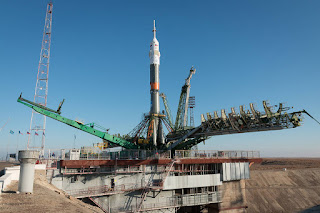NASA is considering
contracting with The Boeing Company for crew transportation services
to and from the International Space Station (ISS) aboard Russia's
Soyuz spacecraft, according to contract documents released Tuesday.
Boeing recently entered
into an agreement with Russia's RSC Energia, manufacturer of the
Soyuz spacecraft. As a part of the agreement, Energia agreed to
provide to Boeing two specifically identified seats on the Soyuz
spacecraft for long-duration travel to and from the ISS, one on a
flight to occur in the fall 2017 timeframe and another on a flight to
occur in the spring 2018 timeframe. Additionally, Energia provided
Boeing three additional specifically identified seats in the spring
2019 timeframe on two Soyuz spacecraft. Boeing and RSC Energia have
agreed that Boeing has full rights to these seats and can sell
them to any third party.
NASA is interested in launching one crewmember in the fall of 2017 and one crewmember in
the spring of 2018, the agency said in a Presolicitation contract document.
The agency is considering purchasing these services from Boeing,
without competition, because no other vehicles are currently capable
of providing these services. The purchase of these services will
increase U.S. crew size on the ISS from three to four crewmembers to
maximize science utilization.
NASA has contracts with
two U.S. commercial companies for crew transportation to the ISS.
However, these vehicles are still in the developmental stage, and not
expected to begin fully operational flights to the ISS until 2019. In
the event the U.S. commercial crew providers are delayed in
demonstrating a fully operational capability to transport humans to
space, the risk of de-crewing ISS greatly increases. “The absence
of U.S. crewmembers at any point would diminish vehicle operations to
an inoperable state,” NASA said in the Presolicitation.
NASA also is considering
an option to acquire crew transportation from Boeing for three
crewmembers on the Soyuz in 2019, to ensure the availability of
back-up transportation capability in the event the U.S. commercial
contractor vehicles are delayed or to augment future ISS operations
and research.
The Russian Soyuz
spacecraft is currently the only vehicle with the operational
capability to provide crew services to and from the ISS in 2017 and
2018. There are eight Soyuz launches planned between 2017 and 2018
(four per year). The crew capacity of the Soyuz is limited to a
maximum of three crewmembers per vehicle.
Russia recently announced its plans to reduce the Russian crew count onboard ISS from three to two, beginning in 2017. As a result of Russia reducing its crew count by one crewmember, there is now an available Soyuz seat in the 2017-2018 timeframe on each of the two planned spacecraft that would have otherwise had two Russian crew aboard. Of the 24 total Soyuz seats available in 2017-2018, the three seats resulting from the Russian crew decrement are the only available means of transporting additional U.S. crewmembers to ISS during this period.
Russia recently announced its plans to reduce the Russian crew count onboard ISS from three to two, beginning in 2017. As a result of Russia reducing its crew count by one crewmember, there is now an available Soyuz seat in the 2017-2018 timeframe on each of the two planned spacecraft that would have otherwise had two Russian crew aboard. Of the 24 total Soyuz seats available in 2017-2018, the three seats resulting from the Russian crew decrement are the only available means of transporting additional U.S. crewmembers to ISS during this period.


